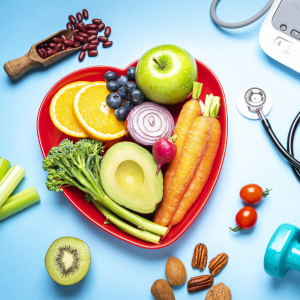Cholesterol
Cholesterol is a waxy, fat-like substance found in all cells of the body. It is essential for the formation of cell membranes, certain hormones, and vitamin D. Cholesterol travels through the bloodstream in packages called lipoproteins, which include low-density lipoprotein (LDL) and high-density lipoprotein (HDL). While cholesterol is vital for normal body function, high levels of certain types can increase the risk of cardiovascular diseases.
Types of Cholesterol:
- Low-Density Lipoprotein (LDL): Often referred to as “bad” cholesterol, high levels of LDL can lead to plaque buildup in the arteries, increasing the risk of heart disease and stroke.
- High-Density Lipoprotein (HDL): Known as “good” cholesterol, HDL helps transport cholesterol away from the arteries and back to the liver, where it can be processed and removed from the body.
- Triglycerides: Another type of fat in the blood that, when elevated, can also increase the risk of heart disease.
Symptoms of High Cholesterol: High cholesterol itself does not cause symptoms and is often referred to as a “silent” condition. It is typically discovered through a blood test. However, high cholesterol can lead to atherosclerosis, a condition where plaques form on the artery walls, potentially leading to:
- Chest Pain (Angina): Due to reduced blood flow to the heart.
- Heart Attack: Caused by a blockage in the coronary arteries.
- Stroke: Resulting from a blockage in the arteries supplying blood to the brain.
Therapies and Treatments for High Cholesterol:
- Lifestyle Changes:
- Dietary Modifications: Eating a heart-healthy diet low in saturated fats, trans fats, and cholesterol. Increasing intake of fiber, omega-3 fatty acids, and plant sterols/stanols can help lower LDL cholesterol.
- Exercise: Regular physical activity can help raise HDL cholesterol and lower LDL cholesterol and triglycerides.
- Weight Management: Maintaining a healthy weight can improve cholesterol levels and reduce cardiovascular risk.
- Quit Smoking: Smoking cessation improves HDL cholesterol levels and overall heart health.
- Medications:
- Statins: The most commonly prescribed medications for lowering LDL cholesterol. They work by reducing the liver’s production of cholesterol.
- Bile Acid Sequestrants: Help lower cholesterol by binding bile acids, prompting the liver to use excess cholesterol to make more bile.
- Cholesterol Absorption Inhibitors: Reduce the amount of cholesterol absorbed from food.
- PCSK9 Inhibitors: A newer class of drugs that help lower LDL cholesterol levels significantly.
- Fibrates: Primarily used to lower triglycerides and can also increase HDL cholesterol.
- Niacin (Vitamin B3): Can help lower LDL cholesterol and triglycerides while raising HDL cholesterol, though it’s less commonly used due to side effects.
Important Considerations:
- Screening: Regular cholesterol screening through blood tests is recommended, especially for adults over the age of 20 and those with risk factors for heart disease.
- Risk Factors: Include poor diet, obesity, lack of exercise, smoking, excessive alcohol consumption, and a family history of high cholesterol or cardiovascular disease.
- Complications: High cholesterol can lead to atherosclerosis, increasing the risk of coronary artery disease, peripheral artery disease, and chronic kidney disease.
Current Research and Developments: Research is ongoing into better understanding the genetic factors influencing cholesterol levels, developing new medications, and exploring alternative therapies like gene therapy. Public health efforts continue to focus on educating the public about the importance of maintaining healthy cholesterol levels through diet and lifestyle.

SANJEEVANI WELLNESS HOME
A sanctuary of holistic healing and rejuvenation, offering personalized wellness programs, expert care, and a serene environment to restore balance and vitality.
#1044, 59th C Cross Rd, beside golden heights mall, 4th M Block, Rajajinagar, Bengaluru, Karnataka 560010.
Important Links
Office Hours
Monday – Sunday
8:00 am – 8:00 pm

